Get involved now with these four service outings happening in January and February.
1. Help Provide School Supplies for Neighborhood Children
Monday, January 27, 2 p.m. to 3 p.m.
Lowenstein Center, Room 1004
Join your fellow Rams on the Lincoln Center campus to wrap school supply care packages for neighborhood children. Participants can also include personal notes of affirmation.
2. Create Food Packages for Senior Citizens in Need
Saturday, January 25, 9 a.m. to 11 a.m.
239 West 49th Street
Fordham’s commitment to the Broadway community goes beyond excellence onstage and behind the scenes. This month, the University is joining Encore Community Services—a Catholic Charity partner just a short subway ride from the Lincoln Center campus—to create food parcels that will support neighborhood seniors in need, many of whom worked in the performing arts. Since 1977, Encore has provided seniors with a range of services to help them live independent and dignified lives in the midtown Times Square and Clinton communities. For this reason, and its focus on initiatives such as “aging gracefully through the arts,” Encore has earned a reputation as “Broadway’s Longest Running Act of Loving Care.”
This event is sponsored by the Office of Alumni Relations, as part of its For and With Others Volunteer Day, but it’s open to the entire University community.
3. Fight Food Insecurity in the Bronx
Friday, January 31, 1:30 p.m. to 3:30 p.m.
St. Ignatius Middle School
Wednesday, February 12, 11:30 a.m. to 12:45 p.m.
McShane Campus Center Entrance
Among the issues affecting New Yorkers daily, food insecurity is one of the most pressing. According to the New York State Department of Health, about one in four New Yorkers report that they do not have sufficient access to food.
Two upcoming events give the Fordham community an opportunity to promote food security in its own backyard. Students and other volunteers will gather to make up to 200 meal packs for community fridges, and conclude the day with a brief Ignatian reflection. The first of these events will happen alongside students at St. Ignatius Middle School in the Bronx. The second will take place at the McShane Campus Center.
Both events are offered through Fordham’s Department of Mission Integration and Ministry, which is rooted in the Jesuit tradition of balancing reflection and action, a practice developed by St. Ignatius Loyola, the 16th-century founder of the Jesuits.
4. Connect with Those Experiencing Houselessness
Sunday, February 23, 11:30 a.m. to 4 p.m.
Meet in the Lowenstein Center Lobby
Volunteers will join forces with students enrolled in the Philosophical Ethics course at the Lincoln Center campus and visit Xavier Mission, a nonprofit organization in Manhattan’s Chelsea neighborhood. Together they will share in conversation and serve a hot meal to people experiencing houselessness in New York City. Attendees will take the brief subway trip together, with MetroCards provided.
This experience is presented by Fordham’s Center for Community Engaged Learning, which connects Fordham with dozens of local and global partners to provide students with opportunities for experiential learning, research, and civic engagement.
]]>Shea, who learned Spanish in elementary school, developed a bond with his Spanish-speaking coworkers. Many of them were men from Mexico, Ecuador, Peru, the Dominican Republic, and Puerto Rico.
“They all worked super hard. I was just working there for a summer job, but many of the guys were working to provide for their families,” said Shea, a 2017 Fordham College at Rose Hill graduate who will earn a Master of Science in marketing intelligence this year from the Gabelli School of Business. He said his personal experiences with the Bronx’s Latino community inspired his decision to join the Jesuit Volunteer Corps (JVC) after graduation.
For a year, Shea will serve as a family self-sufficiency case worker at Catholic Charities of the Archdiocese of San Antonio, where the population is more than 50 percent Latino. He’ll assist families and elderly clients with issues related to poverty, food insecurity, housing, and immigration.
“I wanted to do something where I could see the benefits of what I was doing,” said Shea, who chose not to pursue a “typical office job” after graduating. “I wanted something a little bit more tangible and a little bit more real.”
Shea is one of roughly 300 young adults in JVC’s global volunteering program at any given time, according to Mike Reddy, interim president of JVC.
“Jesuit Volunteers accompany poor and marginalized communities through service within agencies at the front lines of social justice,” said Reddy. “Their term of service in JVC not only benefits those communities, but it also gives our volunteers a sense of purpose, mission, and values for years to come.”
Annie David will serve with JVC for a year as an after-school coordinator and coach for Girls in the Game—a Chicago-based nonprofit focused on helping girls find their voice, confidence, and power through sports.
“It’s kind of like a safe place for girls in Chicago,” said David, who learned firsthand how sports can inspire and motivate when she joined Fordham’s women’s rugby team.
“I had never played before, but being supported by the team and learning that everyone is there to have fun and help each other, that led me to want to pass on what I’ve learned.”
David is graduating with a degree in communications from Fordham College at Rose Hill. Originally from Lynchburg, Virginia, she said that studying and living in a diverse, urban environment like New York helped her to become aware of the challenges faced by marginalized communities.
She thinks the year ahead will help her find her purpose.
]]>As of May 2, eight other graduating seniors also plan to serve with the JVC next year: Brian Kriebel will serve at Catholic Parish Outreach in Raleigh, North Carolina; Stephanie Leo will work at the Law Foundation of Silicon Valley in San Jose, California; Emily Lindo will serve with Civicorps in Oakland, California; Siobhan Loughran will serve at Promise Arizona, an immigrant- rights organization in Phoenix; Christopher Ly will serve at the Midtown Assistance Center in Atlanta; Christina Monaco will work at Preble Street, which addresses issues like homelessness, hunger, and poverty in Portland, Maine; Michelle Nista will work at Friends of the Poor in Scranton, Pennsylvania; and Kathleen Stanovick will work at Raphael House, which serves homeless and low-income families in San Francisco. Greg Rigatti, who graduated in 2016, will serve at Community & Home Supports in Detroit. And Corina Minden-Birkenmaier, a 2017 graduate, will serve as a criminal justice reform intake specialist with the Southern Center for Human Rights in Atlanta.
For Tim Kubart, home is where the music is.
After more than a decade performing for kids and grown-ups, the versatile entertainer received a Grammy nomination for his 2015 children’s album, Home.
“Home is about the small moments in life, the ones that matter most,” Kubart, FCLC ’06, says. It’s the third album of children’s music for the energetic singer, who’s played sold-out shows for audiences of all ages. The recognition for Home is appropriate, since performing for kids is exactly where he feels he ought to be. “It’s really what I feel I should be doing. It drives me.”
That revelation came to Kubart during his Fordham days, when he was volunteering at a homeless women’s shelter as part of the Women in Theology class. He asked if he could play a few songs for the children in the nursery.
“It was the best audience I ever had. It was very clear what I wanted to do,” says the 31-year-old Brooklynite, who’s also known for his role as the “Tambourine Guy” in the band Postmodern Jukebox, a viral success on YouTube.
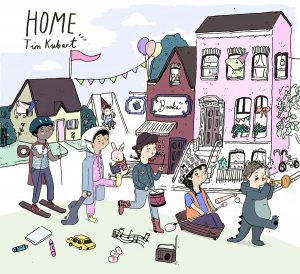
Kubart collaborated on Home with songwriting partner Matt Puckett, FCLC ’09, who played pop music with Kubart in their Fordham days.
“He flew up to New York (from Texas) and we wrote the songs in a few weeks,” Kubart says. “They were written in the voice of a kid but through our own experience.”
The pair also wrote together for Kubart’s other albums, the full-length Anthems for Adventure and Tim and the Space Cadets, an EP titled for the singer and his band. “Now as artists, because we’re getting a little older, we’re thinking about home and the idea of making a home.”
The album’s melodic tunes—like the catchy lead single “The Breakfast Club”—aim to appeal to the whole family.
“We tried to be heavily influenced by all the things going on in pop music, like Taylor Swift, Maroon Five, Beyoncé—what kids are already listening to. But we said, let’s keep the thing that we do, which is celebrating childhood and families,” Kubart says.
When he’s not performing in venues like Brooklyn Bowl, Symphony Space, and Chicago’s Old Town School of Folk, Kubart hosts Sunny Side Up, a live morning show for preschoolers on NBCUniversal’s Sprout Channel. He and his co-host, Chica the Chicken, broadcast from 30 Rockefeller Center weekday mornings for a national audience. Recent guests have included Julie Andrews, William Shatner, and Michelle Obama, who sang a song with Kubart. “She was wonderful,” he says.
A theater major at Fordham, Kubart’s also got some primetime TV and soap opera acting credits under his belt. And he’s performed as the house bass player for NBC’s America’s Got Talent.
But for him, the best audience is the under-12 set and the people who love them.
“I love how honest kids are,” he says. “Kids are not going to be polite and give you what you’re hoping for. They give you what they want to give you in that moment.”
The children’s media he consumed as a boy, he says, played a big part in shaping the person he became. “I want to create media like that for kids. Everything I do, from Sprout to my music to Tambourine Guy—it’s all about kindness and joy.”
VIDEO: Watch Kubart’s acceptance speech at the 58th Grammy Awards.
]]>When she had signed up for Susan Greenfield’s course on homelessness this semester—an English course with 30 required hours of service learning—she was as ready and willing as any Jesuit-educated student to serve the community.
But when she showed up to volunteer at a Bronx shelter for women and children and was told that there was no need for her, Shilo was at a loss.
“When we fulfill a need, we feel important, we feel irreplaceable, and we feel satisfied,” Shilo, a junior at Fordham College at Rose Hill, said during Greenfield’s Friday morning class. “When . . . this need-based satisfaction was taken out of the [equation], I began to question what my motive was in doing service.
“Am I serving simply to feel good about myself, and is it okay if I am, as long as the result is the same? Am I doing it as a type of ‘humble brag,’ making sure everyone knows that I am a socially conscious, ‘good,’ and caring individual?”
Feeling conflicted about service
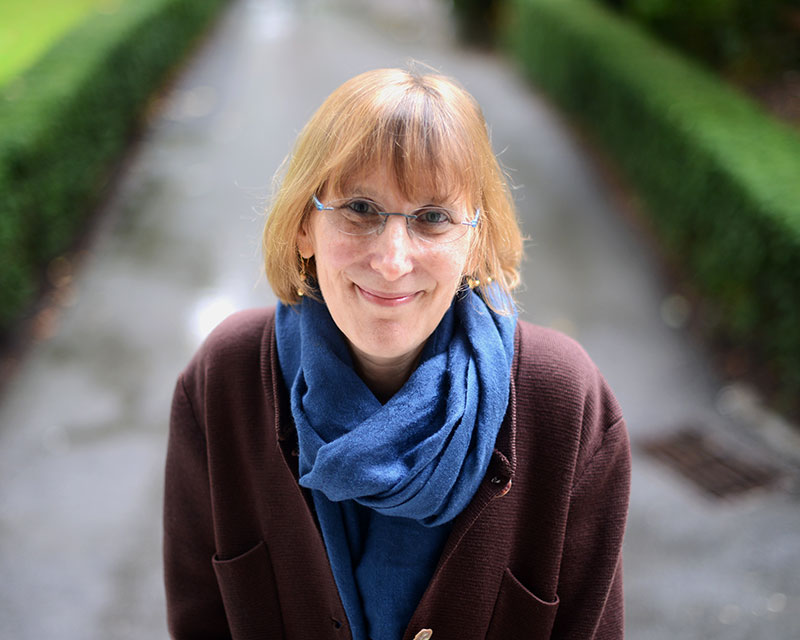
Photo by Joanna Mercuri
These are the tough questions that Greenfield, PhD, a professor of English, wants her undergraduate students to be bothered by. Her course, Homelessness: Literary Representation and Historical Reality, uses a literary approach to examine the complex issues surrounding homelessness. On the reading list are texts ranging from classics such as The Grapes of Wrath to contemporary memoirs such as Lee Stringer’s Grand Central Winter: Stories from the Street.
On the experiential side, students have heard stories firsthand from formerly homeless individuals who spoke to the class. In addition, the students are required to complete 30 hours of service in an organization that serves the homeless—a fairly easy quota to fulfill when you live in a city of more than 59,000 homeless men, women, and children. (In fact, this estimate is extremely low, because it does not include the number of people living on the street, nor the number of women and children in domestic violence shelters.)
The service component, it turns out, has prompted a healthy amount of internal conflict.
In response to Shilo’s predicament, another student in the class shared her ambivalence about the idea that volunteering helps the privileged become more aware of and sympathetic to those in need. “It’s service, but you’re just ultimately serving yourself,” she said. “I don’t have an answer to that dilemma.”
That may be, but educating and inspiring those who do service can still be useful, suggested another student. “Look at an organization like Part Of The Solution (POTS),” he said. “That’s how POTS began—[the founders]had an initial experience of service and then began that organization, which really does make a difference.”
The desire to “make a difference” is often what draws students to service, Greenfield said. In class, however, as they’ve begun to consider that desire, the students are learning that “making a difference” is a nebulous goal. Moreover, there seems to be a tacit power dynamic beneath their good intentions.
“Someone needs and someone is needed. Being needed feels good; being in need doesn’t feel so good,” Greenfield said. “That idea, to me, is important. Is there a way to do service that fosters equality rather than replicating the power problem that created the situation in the first place?”
One way to achieve that is to respect the autonomy of whoever is being served, she said. “Even a simple gesture [such as]saying ‘Can I help you?’ rather than ‘Let me help you,’ is a political change. It’s a move from ‘I’m going to do this’ to ‘Do you want me to do this?’ That’s how you can make a difference on the local level.”
Heroism and homelessness
Literature is an entryway into these kinds of conversations, Greenfield said. Many texts, such as Shakespeare’s King Lear and Mark Twain’s Adventures of Huckleberry Finn, exalt homelessness rather than view it as a social failing.
“The characters who fall socioeconomically ultimately rise as human beings. They become even better people,” Greenfield said. “There’s a certain nobility and integrity that comes from ending up at the bottom. It becomes a kind of heroic act to have fallen.”
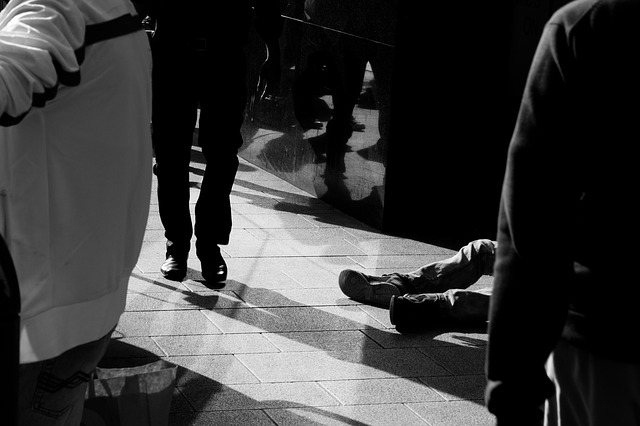 And yet, that hardly serves as solace for someone living the trauma of homelessness. It still overlooks the question of whether one can ever alter the power struggle in the service dynamic—or, as Shilo wondered, whether it even matters if the end result still benefits the person being served (or at least does not cause harm).
And yet, that hardly serves as solace for someone living the trauma of homelessness. It still overlooks the question of whether one can ever alter the power struggle in the service dynamic—or, as Shilo wondered, whether it even matters if the end result still benefits the person being served (or at least does not cause harm).
“I always find when I teach this course that there’s a place at which my brain just stops. I can’t get beyond some of these questions,” Greenfield said. “It’s not like reading literature and discussing, where you have a eureka moment and reach some kind of conclusion.”
There’s no clear-cut answer, unfortunately. Greenfield cautions her students about this upfront: “Unless we ourselves have been homeless, we cannot presume to understand the trauma,” she wrote in the course syllabus. “But we can open ourselves up to learn about it and to work toward social justice.”
Sometimes, forming relationships are the only option available. To that end, stories are a good start.
“Literature is an exercise in imagining another person’s experience and being open to it,” Greenfield said. “To bring that kind of awareness and openness to people who you might normally just pass by and not even notice, it does change things.”
]]>The week begins with Masses of Anticipation on Sunday, Sept. 20 at 8 p.m. in the University Church at Rose Hill and 7 p.m. in the Pope Auditorium at Lincoln Center. These will be followed by ice cream socials for students and the University community.
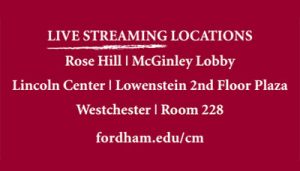 In the days leading up to the pope’s visit, Fordham will be preparing “spiritually and pastorally” in every way it can, said Lito Salazar, SJ, executive director of campus ministry.
In the days leading up to the pope’s visit, Fordham will be preparing “spiritually and pastorally” in every way it can, said Lito Salazar, SJ, executive director of campus ministry.
“We are encouraging daily and Sunday Mass homilists to consider invoking Pope Francis’ words or commenting on his global pastoral ministry whenever relevant to unpacking Scriptures at liturgical celebrations,” Father Lito said.
“In addition, the intentions of the pope and his visit have been and will continue to be in the intercessory prayers of the faithful. The Holy Hour devotion set for Mondays will have the same intention.”
Watch the pope live
On Thursday, Sept. 24, the day the pope travels from D.C. to New York, Fordham will live stream Pope Francis’ morning address to the U. S. Congress on all three campuses, beginning at 9:20 a.m.: the McGinley lobby at Rose Hill; Lowenstein 2nd floor plaza at Lincoln Center; and Room 228 at Westchester.
The pope’s address to the United Nations, which takes place Friday, Sept. 25 at 8:30 a.m., will also be live streamed from these locations.
In addition, students can enter into a lottery to win a ticket to that evening’s papal Mass at Madison Square Garden. The lottery can be found in the student tab at my.fordham.edu.
Students and community members will also have the opportunity to pray evening vespers along with the pope as he leads evening prayer at St. Patrick’s Cathedral on Thursday, Sept 24. Beginning 6:45 p.m., the vespers will be streamed at University Church and Our Lady’s Chapel at Rose Hill and at Blessed Rupert Mayer, SJ Chapel at Lincoln Center.
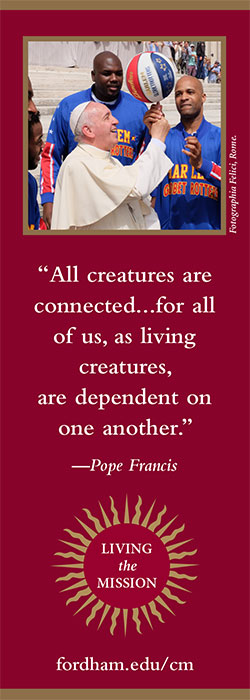 Community service
Community service
On Saturday, Sept. 26, students are invited to participate in a community service project in honor of the pope’s visit. Participants will join Habitat for Humanity’s Pope Francis House in Yonkers to help construct homes
“Care for the poor and the marginalized is a central theme of Pope Francis’ papacy, and using our gifts and talents to care for the needs of others is something that’s part of Fordham’s identity as a Catholic and Jesuit school,” said Conor O’Kane, director of campus ministry at Rose Hill.
“The pope has an authenticity and spiritual freedom that resonates with our students,” O’Kane said. “His leadership and emphasis on what it means to be a person of faith in the world today is a question that’s relevant to all of our students. So his messages have been animating all that we say and do here [in campus ministry].”
Over the next two weeks, the University community can keep an eye out for papal experts from Fordham, who the Office of Communications has lined up to appear in the news. A full list of faculty experts and where they will be appearing is available here.
]]>
The annual Honor Roll, which is the highest federal recognition a school can receive for its community service, salutes institutions that achieve meaningful and measureable outcomes in the communities they serve. This year marks the fourth time Fordham was named to the Honor Roll.
“Social justice is at the heart of Fordham’s [mission]and we’re excited to receive an award that reflects the work we do as a whole,” said Sandra Lobo-Jost, FCRH ’97, GSS ’04, director of the Dorothy Day Center for Service and Justice, which is the liaison organization between Fordham and its surrounding communities in the Bronx and Manhattan.
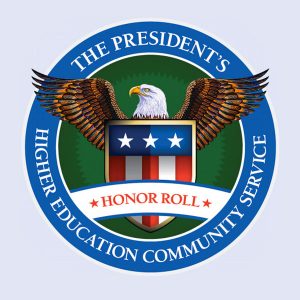 Fordham was recognized in the categories of “General Community Service” and “Education.” The general category acknowledges institutions that are committed to improving the quality of life within the community—particularly for low-income individuals—in any form of service, including education, health, economic opportunity, environmental restoration, and support for veterans and military families. The education category recognizes institutions that work to improve educational outcomes for children and youth in pre-K through undergraduate education.
Fordham was recognized in the categories of “General Community Service” and “Education.” The general category acknowledges institutions that are committed to improving the quality of life within the community—particularly for low-income individuals—in any form of service, including education, health, economic opportunity, environmental restoration, and support for veterans and military families. The education category recognizes institutions that work to improve educational outcomes for children and youth in pre-K through undergraduate education.
Among the public service projects in which Fordham students volunteered were New York City’s HOPE Count to estimate the number of homeless New Yorkers and Urban Plunge, a program in which student volunteers work to combat hunger, promote affordable housing, educate youth, and foster community development in various communities across New York City.
The Dorothy Day Center also connected Fordham’s student groups with at-risk youth in local middle and high schools to provide mentorship, arts and academic workshops, and to offer guidance to high school student clubs.
Universities are chosen based on innovation of service projects, percentage of student participation in service activities, incentives for service, and the breadth of academic service-learning credits. This final criterion is another important component of Fordham education, which includes more than two dozen “service integrated” courses across all disciplines.
Launched in 2006, the President’s Community Service Honor Roll highlights the roles that colleges and universities play in serving local communities and in gearing students toward a life of civic engagement. It is an initiative of the Corporation for National and Community Service, the agency that oversees federal service organization such as AmeriCorps, Senior Corps, and the Social Innovation Fund.
]]>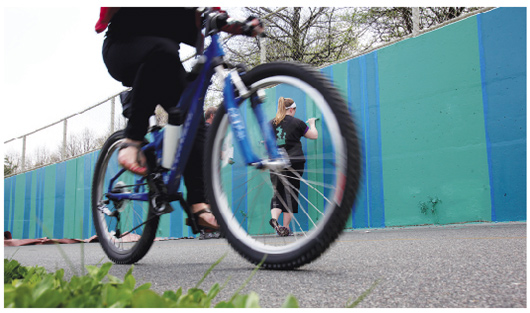

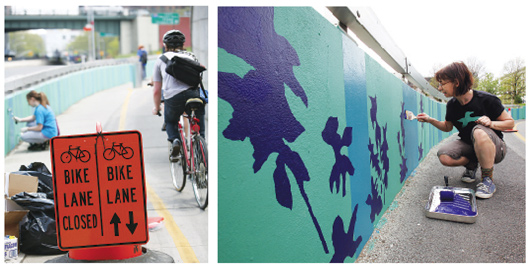
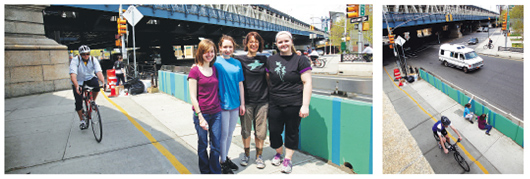
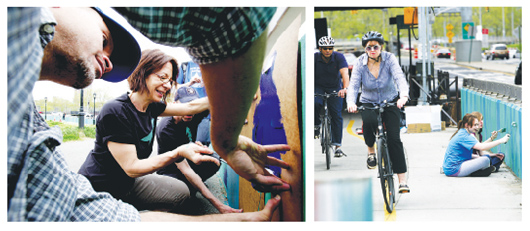 ]]>
]]>In a blighted section of North Camden, N.J., Fordham student volunteers don’t have to look far to find the presence of a higher power.
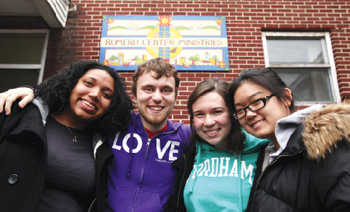
Photo by Bruce Gilbert
It’s between the lines in a story relayed by a diabetic undocumented immigrant, who struggles daily with a disease he can only get treatment for in an emergency room.
It’s in the maternal glance of a woman watching over her sleeping brother, who is a homeless drug addict, high and slumped in a wooden chair at a public day shelter.
It’s among the boxes of donations to a clothing bank, where those among Camden’s 56 percent unemployed can receive a free coat on a frigid day.
And it’s in the instant communion between two lonely nursing home residents who have been introduced by volunteers and are now conversing over a meal.
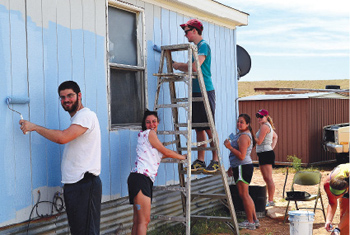
Photo courtesy of Global Outreach
Fordham’s Global Outreach (GO!), a service and cultural immersion program, helps bring scenarios like these to students by providing volunteer opportunities both nationally and internationally. This year, GO! visits Camden and 32 other localities worldwide, bringing nearly 400 undergraduates face-to-face with the meaning of faith in, love for, and solidarity with communities that have been marginalized.
Now in its 22nd year, GO! has become the largest Jesuit college immersion program; this year more students participated than ever, said director Paul Francis, with new projects to Detroit, Ukraine, Ecuador, the Dominican Republic, and Guyana.
“GO! has a direct connection to the mission of Fordham as a Jesuit institution,” said Francis (GSAS ’03, GBA ’10), a former Jesuit Volunteer Corps (JVC) member. “We like to say that what you learn inside the classroom is enlightening; what you do outside of the classroom is transformative.
“We want our students to be affected by the gritty realities of the world, and to undergo a personal transformation.”
Aisha Blake, a Lincoln Center campus junior studying information science, has experienced that transformation. Blake was so moved by her 2011 Camden trip that she joined the GO! executive board and worked to make certain enough applicants signed up for this year’s project—tempting candidates with brownies to get their attention.
“GO! Camden is not the most popular program,” she said, noting that international projects are far more popular. “It’s not exotic, and it’s considered dangerous because Camden is notorious for poverty and crime.”
Blake recruited nine undergraduates and one recent graduate. The group spent part of winter break volunteering at service sites around Camden through the Romero Center, an urban retreat house and social justice educational center.
What is unique about GO!, Francis said, is an emphasis placed on community-building prior to the trips. Each team of 10 to 12 students strengthens its bonds through weekly meetings, fundraising, a retreat, and one-on-one sessions between members at which they develop close ties. Francis calls it a “spiritual element” of the program.
“We don’t just sign up and go,” Francis said. “The preparation and the follow-up are as important as the immersion itself.”
That preparatory aspect of GO! resonated with Camden participant Charlie Martin, a Lincoln Center campus sophomore.
“The community-building we did within our team brought a unity and focus to the community engagement that we practiced in Camden,” he said. “It helped us navigate the challenges.”
Camden’s Romero Center puts its service volunteers through the Welfare Food Exercise. For 24 hours, Team Camden had to live on whatever they could afford to buy on a daily budget of between $9 and $12 for a family of four—approximately the same amount received from the U.S. government food stamp program.
Abandoning any proclivities for vegan, vegetarian or organic cuisine, Team Camden ate hot dogs, white bread, eggs, cereal, rice, and Ramen noodles filled with plenty of corn syrup, sugars, and hydrogenated vegetable oil.
“We were tired and hungry,” said Michelle Ahn, a Lincoln Center campus junior. “I never realized how hard it was, especially for people who can’t have sugar. How does a family go to work or school all day and have a box of macaroni and cheese for dinner? It’s unsustainable.”
* * *
On a bone-chilling Friday in January—the last day of service for Go! Camden—team members are assigned to work at the New Visions Community Day Center and Free Store, which provides clothing and meals to 175 impoverished residents daily.
The team spends the morning unpacking and hanging donated clothing. At lunchtime, they move to the dining room to converse with the center’s clients, who mostly come from the neighborhood—including a nearby backwoods community living in tents. In an area rife with pushers, prostitutes, and drug dens in boarded-up houses, the center offers a respite from
7 a.m. to 10 p.m. The rules are simple:
no drugs, no weapons, no fighting, and respect for everyone there.
Dan Drolet, a Lincoln Center campus senior with a small patch of day-glow yellow hair, strikes up a conversation with an unemployed ex-Marine and ex-con. In spite of enormous differences in opportunity, Drolet said he can identify with his conversant, as well as the others at New Visions.
“These are not broken people,” he says. “Homelessness isn’t chronic. They will get back on their feet.
“If I’d been born into circumstances like theirs, I’d be right where they are,” he says, “so they’re not that different from me.”
* * *
Many GO! participants, Francis said, develop a lifelong interest in doing service after experiencing one or two trips. A single summer working in the fashion industry following graduation was enough to convince Team Camden chaperone Angela Pokorny (FCRH ’11) to switch to community service.
“Being in GO! inspired me to join JVC,” said the recent graduate.
Pokorny is not the only alumna to have been “ruined for life,” a JVC motto that implies that students exposed to wrenching poverty up close will never be comfortable with injustice.
Makenzie Schmitt (FCRH ’09) made a GO! trip to El Salvador and worked with an organization that worked with youth in gangs. Today, Schmitt is a bilingual teacher at Omaha’s Yates Community Center, where the former Spanish major teaches adult immigrants and refugees to speak English.
“GO! was the most influential thing that happened to me while at college,” she said. “Having a community of like-minded people to help you make a commitment—rather than chase a paycheck—makes a huge difference.”
Such dedication by students who find their calling in service inspired Mary Anne Sullivan (TMC ’73) to create the Eileen Ahern Sullivan (UGE ’42, LAW ’46) and Francis J. Sullivan (LAW ’34) Endowed Scholarship Fund. The fund supports one GO! student per year on an immersion trip. It also honors Sullivan’s parents, who raised her to embody the principles and values that are embraced by GO!: belief in community, spirituality, simple living, and social justice.
“I was struck that the set of principles to which GO! students subscribe are the same principles my parents raised me to believe in,” said Sullivan, a D.C.-based energy lawyer. “My family members were observant Catholics; before it was fashionable, they were into a whole range of social justice issues—volunteering to help the poor, building community.
“At a time when interactions among the races were rare, we had a parade of people through our house, often staying with us as exchange students. It made us oddities in the neighborhood, but it stuck with me.”
Because the University supplies only 10 to 15 percent of GO!’s budget, fundraising is a large part of GO!’s student activities. Each GO! team is responsible for raising the money for its trip through various jobs or solicitations. While a trip to Camden is relatively inexpensive at $450, international trips can range from $1,700 to $3,750.
* * *
Following a day of service, GO! Camden gathers in the spacious living room of the Romero Center for prayer and reflection. Ahn sums up her day working in the Habitat for Humanity ReStore, a 15,000-square-foot warehouse stocked with furniture, fixtures, and appliances. Proceeds support new affordable housing for area residents.
“Just helping the community is an amazing thing,” she says. “There are lots of people tight for money, but they can afford to shop here and [at the same time]support new construction.”
Even though Apollonia Colacicco felt sick during her service at the MLK Daycare Center (she was, she admits, hungry from the Welfare Food Exercise), she says she feels rewarded for having won over the two- and three-year-old children with her monster impressions.
“I’m not good with kids; I thought I would struggle,” says the Lincoln Center campus junior. “But their laughter, it really touched my heart.”
As the team sinks into the end of their day, they laugh, ponder, and even engage in horseplay. Reflecting on Camden’s many social and economic problems, Martin wonders if their small presence really made a difference in a city where many problems are systemic ones.
But the answer seems unanimous among the group, each of whom has come to see volunteer service in a new light.
“What we’ve discovered is that, for us, we are not here to change Camden,” he says. “Camden is here to change us.”
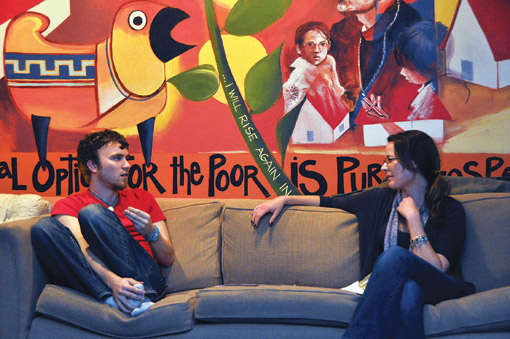
Photo by Janet Sassi

Fifteen Bronx-area high school students ensured that the borough’s history was told on July 30 as they presented their original historical research to an audience of family, University faculty and staff at Fordham’s Rose Hill campus.
The teens spent the summer participating in History Makers, a six-week program that is a collaboration between Fordham’s Community Service Program and the Citizens Advice Bureau (CAB), a nonprofit settlement house that runs a youth enrichment program for college-bound teenagers in the Bronx. The program teaches Bronx high school students how to perform professional-level historical research in the city’s archives, libraries and museums. Participants worked in University classrooms and the library and spent the last week living on campus in a residence hall, giving them the full college experience.
Now in its fourth year, History Makers is funded by a $240,000 grant provided by The Teagle Foundation through its College-Community Connections program, which supports partnerships between community based organizations in New York City and area colleges and universities.
“I feel like we probably do the easiest thing – provide the funds so that the program can happen,” said Cheryl Ching, program officer for The Teagle Foundation, “but all the hard work and all the credit goes to the History Makers and to the staff at Fordham and CAB. We’ve had the privilege throughout the last four years to support this partnership between Fordham and CAB and it’s been fantastic.”
Sandra Lobo-Jost (FCRH ’97), director of Fordham’s community service program, said despite it being History Makers’ fourth year, there was something “different and special” about this summer’s program.
“Our partnership with CAB helped to create one of the best programs I’ve seen so far,” she said. “Our collaborative relationship with CAB has been at the heart of this project. Thanks to their efforts, we had one of the most impressive groups of scholars during this program. I’m extremely proud of the services that Fordham University has provided our scholars this year. I’m looking forward already to having the scholars back during the academic year.”
Choir Academy of Harlem junior Kerricia Griffith, 16, has always wanted to apply for college. She feels even more prepared now with two years of the Fordham’s History Makers summer program under her belt.
“It is a lot of work to conduct college level research but now I know I can handle it if I apply myself,” said Griffith, just minutes before joining fellow students in presenting their research on “Afro-Latino Music in the Bronx.” “I’m really proud of what we’ve accomplished here.”
Griffith said her group used databases, library archives and personal interviews to research the “second-wave” of Afro-Latino music such as bachata, merengue, bomba and plena.
Students are guided by faculty from Fordham and other universities as they pick a research topic. They are then helped by college mentors, such as recent Fordham graduate Ariana Allensworth (FCRH ’09).
“It was a great experience for me because I am currently applying for jobs in youth empowerment,” Allensworth said. “They were a great group and it was a lot of fun.”
The curriculum for the program typically goes beyond subjects that are covered in high school or college textbooks. Allensworth’s group, for example, researched the “Public Housing Experience in the Bronx.” Other topics included “Environmental Racism in the Bronx” and “Images of the Bronx According to Film.”
The program director for this past summer’s program was Stephanie Crane (FCRH ’09), who has participated in the program since the summer of her freshmen year at Fordham.
“I cannot say enough things about this group. We’re very proud of them,” Crane said. “And [their research]is their history.”
]]>Thanksgiving Food Drive – November 10 through 21
Local food pantries are struggling to meet the needs of their clients, particularly during the holiday season. If you would prefer to make a monetary donation, please make checks out to “Campus Ministry.”
Non-perishable food items and checks may be brought to:
ROSE HILL: McGinley Center 101 or 102
LINCOLN CENTER: Lowenstein 217
Winter Clothing Drive – December 1 through 19
As the weather gets colder, we will begin to collect warm winter clothing in good condition to be distributed through our community partners. If you would prefer to make a monetary donation, please make checks out to “Campus Ministry.”
Coats, sweatshirts, scarves, gloves, sweaters, and socks, as well as checks may be brought to:
ROSE HILL: McGinley Center 102
LINCOLN CENTER: Lowenstein Plaza (bins at the top of the escalator)
For more information, please contact
CAMPUS MINISTRY
Rose Hill: 718-817-4501 or [email protected]
Lincoln Center: 212-636-6267 or [email protected]
COMMUNITY SERVICE PROGRAM
Rose Hill: 718-817-4510 or [email protected]
Lincoln Center: 212-636-7464 or [email protected]
We thank you on behalf of our community partners and neighbors for your generosity.
]]>